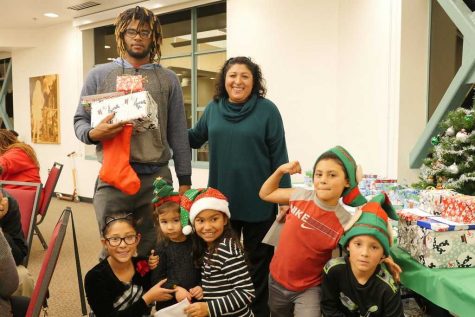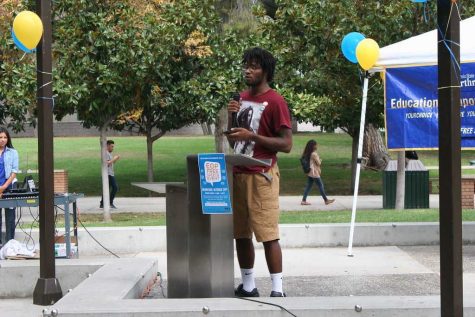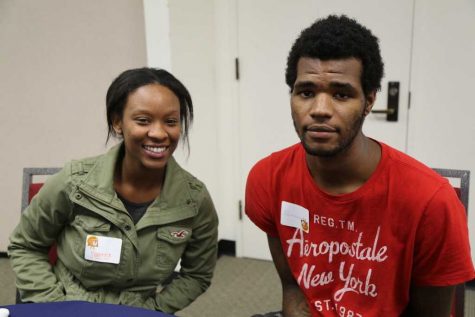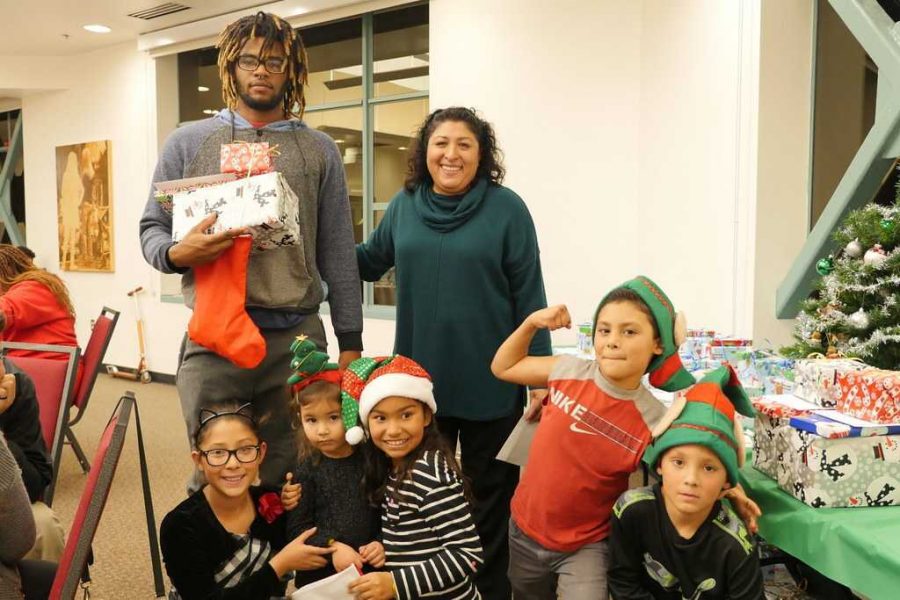Chapter 1: “His future was bright, but his life was taken too soon.”
It was the first day of the summer semester of 2014. The classroom began to fill with students who scattered about, looking around for a familiar face before settling down near the back of the class.
There he was, quietly waiting in the front corner of the classroom. All 6 foot 4 inches of him sat awkwardly in a typical chair and desk combo that commonly furnishes a classroom. The choice to sit in the front of the classroom was an intentional move. It was a message that said, ‘I’m here, and I’m ready to learn,’ and this simple action would leave a lasting impression. This day would mark the beginning of his academic journey, one that would bring him hope and optimism.
His name was Quinten Thomas. He was the type of guy that knew everyone, and everyone knew him. He put others first. He showed humility by admitting his faults but he rarely boasted of his accomplishments. He inspired many others because his heart was led by love. He was a father, a friend and a CSUN Matador.
His future was bright, but his life was taken too soon.
On the morning of March 9, 2018, he died in police custody at Twin Towers jail in downtown Los Angeles. The details surrounding his death remain a mystery. The only thing that’s clear is his impact on the lives around him and his desire for a better future.
At first glance, Quinten looked intimidating. He was tall, Black, tattooed and weighed nearly 200 pounds. When he spoke, the whole room looked in his direction to see where the baritone-like voice was coming from.

Those that remember meeting Quinten said he was soft-spoken and shy at first. Maybe his tall build, deep voice and Black skin were intimidating to others, so he instinctively knew to speak softer to put others at ease. Everyone that crossed his path said once you got to know him, he was a “giant teddy bear” who thought of others before himself.
Quinten was raised in the Los Angeles foster care system and was admitted to CSUN through the Educational Opportunity Program, which provides aid and mentorship to foster youth and low-income and first-generation college students.
In the summer before his first semester at CSUN, Quinten was selected to join the EOP Resilient Scholars Program. He filled out the application and had an interview with EOP, where he had to demonstrate that he was highly motivated and had the potential to graduate. Usually, the students in this program wouldn’t be admitted to CSUN, but the RSP grants them special admissions.
The program aims at ensuring students have access to campus resources such as help with the admissions process, financial aid and year-round housing. According to the EOP website, without these support service programs, less than 1% of all foster youth who attend a four-year university graduate from college.
Jina Gonzalez, associate director of EOP, was one of Quinten’s mentors who helped him navigate college life. Gonzalez said that Quinten often hung around the EOP lab and regularly visited her, probably more than any other student. Gonzalez helped him secure housing on more than one occasion. She acted as a mentor and sometimes, she was a mother figure to Quinten. When he felt like giving up on college, she was a source of motivation.
Some semesters, Quinten struggled to keep afloat. The pressures of college and the constant stress of depending on resources for basic needs caused Quinten to fall behind in some classes. In 2016, he began suffering from epileptic seizures, which also contributed to his stress levels.
But despite the moments of lost motivation, he didn’t give up. He was proud to be at CSUN. People that knew him said he was committed to his academic future. He never passed up an opportunity to talk with others about the benefits of higher education and how it changed his life.
CSUN often hosts campus tours and events for foster youth in middle school and high school. Whenever there was an on-campus event, Quinten always volunteered to speak with the youth groups about his background and experiences. Quinten acted like a big brother to these prospective students. Sometimes, he would bring friends to the campus on his own accord and give them a tour. More than once, he went back to his high school in Lancaster to talk to students about the value of college. It was his way of saying ‘if I can do it, so can you.’
Quinten felt compelled to give back and show other students the opportunities that he was given. Gonzalez said that Quinten left a valuable impression during the tours because students would ask ‘Where’s Quinten?’ when they returned to campus.
“He was always the type of person that talked to everyone,” Gonzalez said. “He just crossed barriers and didn’t care who you were or what you were. He made a lot of connections and relationships with CSUN people.”
He decided to major in health administration to become a registered nurse because he wanted to make a difference in people’s lives. His experience in EOP opened up the path to his potential. But above all else, he found something priceless there: he found a community and home.
In 2014, Quinten gave a heartfelt speech on his experience in EOP during the Resident Scholars Program ceremony. His speech was enough to make the hairs on your arms stand up. He spoke with a level of self-awareness that showed a wisdom that extended beyond his years.

“If this hour was the last hour I had on earth, and God told me to give my last words before I left, I would say thanks to those in my EOP family for believing in me. This has been one of my best experiences in life,” he said.
He revealed that before joining EOP, he assumed that all families were dysfunctional because his family was. Quinten was a byproduct of a system that never showed him what a family could be. He shared with peers and mentors that some of his family members had gang affiliations.
“You see, I come from a community of poverty, hate and violence,” Quinten said. “Being here at EOP Bridge has helped me to realize that parents are only human. Forget about the things you wished you had or could’ve had, and notice the things you have, and that’s love. I want everyone to know that someone somewhere … loves you.”
Quinten wanted nothing more than to leave that world behind and escape those physical and psychological dangers he grew accustomed to. He wanted to achieve something that no other man in his family had done until that point, graduate from college. He knew that CSUN was his ticket to that brighter future.
“He would always say I don’t want to go back to where I came from; it’s not good for me,” Gonzalez said. “That was hard to hear on a regular basis. So, we tried to keep him as close to us as possible and just keep him busy.”
Tye Roberts, 24, one of Quinten’s closest friends at CSUN and former roommate, called him an “early bird.” Quinten would wake up at 6 a.m. and blast his favorite rapper Chief Keef while studying for class.
Quinten wasn’t the type of college student who stayed up all night, frequented parties or hung out in the streets being reckless.
Roberts looked up to Quinten like a brother and an inspiration. He saw how much Quinten would light up when talking about his goals and aspirations.
“He was a good person; he meant well. He wanted to succeed in life and wanted to improve his living situation, just like we all are,” Roberts said. “We’re [all] trying to live and improve our situation, just level up in life; that’s what he wanted to do.”
Roberts, also a former student with CSUN’s EOP, said that when he met Quinten, he was quiet and always had a poker face.
“You couldn’t tell if he was mad, angry, or if that was just his natural face,” Roberts said.
When they became close, Quinten felt comfortable enough to flash his magnetic smile and let out a hearty laugh.
For nearly a year, the two were practically inseparable. They would go to class in the mornings, study at the University Library or EOP office, spend the remainder of the day goofing around, playing “Madden NFL,” ordering burgers, bottomless french fries and strawberry lemonades from Red Robin.
Roberts said that Quinten was an honest friend who wasn’t afraid to face his responsibilities. He didn’t procrastinate and didn’t shy away from admitting his faults. He asked for help when he needed it.
William Watkins, dean of students and vice president of Student Affairs, remembers Quinten walked up to him, introduced himself and said, ‘I’m a freshman here, and I’m having some difficulties.’ Quinten shared with him that he had received a university bill, which charged him $2,600 for the damage of a piece of equipment he rented.
Watkins was able to resolve the issue for him within 24 hours. Overcome with gratitude and amazement, Quinten emailed Watkins to ask him if he would mentor him.
“We did that, and over the years thereafter, I had a chance to come to know him to know his struggles. To know where he had come from, his challenges with numbers of systems, and his continuous efforts to work things out both in his academic life as well as his personal life,” Watkins said.
Quinten was far from perfect — he was opinionated and stubborn at times. When he felt comfortable with a person, he had no problem speaking his mind and ruffling feathers.
Quinten and his EOP family didn’t see eye to eye. One time, he disagreed with some of Gonzalez’s advice regarding housing options. He sent her a passionate email giving her a piece of his mind.
“He knew the advice that I gave him came from the heart and came from a good place, and maybe at that time when I gave him the advice, it wasn’t something that he wanted to hear,” Gonzalez said.
After a few days and sometimes weeks, when he understood what Gonzalez was trying to say and do, he would always come back to her and apologize.
“But when he realized that it was for his benefit, he did acknowledge it, and he would come back and say ‘now I understand what you’re trying to say.’ So, I think it was very mature of him to do that,” Gonzalez said.
Quinten was always forthcoming and honest about his mistakes, whereas, he never bragged or looked for praise when he did something right. Glenn Omatsu, EOP Faculty Mentor Program coordinator, said that he would always hear about Quinten’s good deeds from other students or mentors.
Omatsu said that Quinten was able to help other people without even realizing that he was helping others. He recalled a story about Quinten that another EOP student told him.
During the second week of the summer EOP program, this other student decided that he and Quinten would “have it out” because both men had family affiliations with rival gangs. The two young men were destined to fight, like rivals from opposite sides of town.
Omatsu said that one afternoon when the coast was clear, the other student waited in the empty halls of the EOP offices to confront Quinten.
Except Quinten had no plans to fight.
“Isn’t it great that we’re both college students, and we don’t have to fight?” Quinten said to the other student.
Quinten walked away shortly after that, but his calm and positive response left a lasting impact on the student.
Quinten didn’t want to jeopardize his opportunity with CSUN and was fighting for something bigger and better.
He encouraged the ones around him to do the same.

“For all my Bridge peers, my homies — my riders, I want you to know that you can do anything you put your heart to,” Quinten said in his 2014 speech.
Quinten’s death came as a surprise to many. He wasn’t known to be a violent person; he didn’t have a criminal record, and before March 2, 2018, he had never been arrested.
Gonzalez remembered the day she found out about Quinten’s death.
“I couldn’t believe it. I never expected it and for him to die by himself in prison. I think it’s very hard just knowing that,” Gonzalez said. “I can’t even imagine what he went through.”
With no money or assets to his name, it wouldn’t be an easy task to ensure Quinten received a proper burial. It took a literal village to cover the cost. Through donations, a GoFundMe campaign and the assistance of the CSUN Foundation, the burial funds were raised. CSUN collected more than $3,300 from individuals and contributed $1,500 from the university to help cover the remaining expenses, according to Ira Unterman, chief financial officer of the CSUN Foundation.
Gonzalez credits former President Dianne F. Harrison for approving the $1,500 allocation to cover Quinten’s burial and services.
“I just remember that someone told me that [Harrison] said to make it happen and that they were gonna figure it out, and they figured it out,” Gonzalez said. “I just gave them the information they needed, and I didn’t have to do anything after that.”
His impact on the people he met was evident during his funeral services. Everyone from childhood friends and family members to EOP and CSUN staff and peers paid their respects. Gonzalez said the crowd at Quinten’s funeral was mixed between young and old, with people she hadn’t seen in years.
Quinten’s memory continues to live on. Fundraising efforts have been created to raise money to support his three-year-old daughter, Ashanti. Since Quinten’s death, there have been memorials held in his name. Black Lives Matter Northridge chapter and Ashanti’s mother, Sahaara White, have taken to the street to demand answers. CSUN’s Faculty Senate called for the university to create a legal fund for White to continue to pursue justice for Quinten.
On Feb. 17, organizers from Project Rebound hosted an event, “Remembering Quinten Thomas: The Fight for Justice Continues,” where White joined other community activists and spoke about the struggle to seek justice for Quinten. Project Rebound is a campus organization that supports and mentors formerly incarcerated individuals, by making higher education more accessible.
Recently, CSUN launched a yearly scholarship opportunity in Quinten’s name that awards an eligible student $1,000. Current undergraduates and graduate students can apply if they have been former foster youth, formerly incarcerated, youth on probation, or unhoused.
Martha Escobar, an associate professor in the Department of Chicana and Chicano Studies, is one of the scholarship organizers. She said that idea for the scholarship originated during a discussion between Escobar, Gonzalez and other leaders in EOP, and the University Student Union. They wanted to memorialize Quinten and create a scholarship that will serve as a reminder of the struggles that some students go through.
“We wanted to make sure we remember Quinten because he represents a lot of our students and their struggles,” Escobar said. “And the kind of work that we need to do to make sure that none of our students go through what he went through,” Escobar said.
Quinten’s peers and mentors promise to continue to honor his legacy. At the Project Rebound event, Watkins shared the importance of carrying the torch to “fight systems of oppression and to take on systems of inequity that lockout and take lives away.”
Watkins closed his comments by making a vow: “Certainly, as long as I’m around, Quinten will be honored and will be remembered.”.
